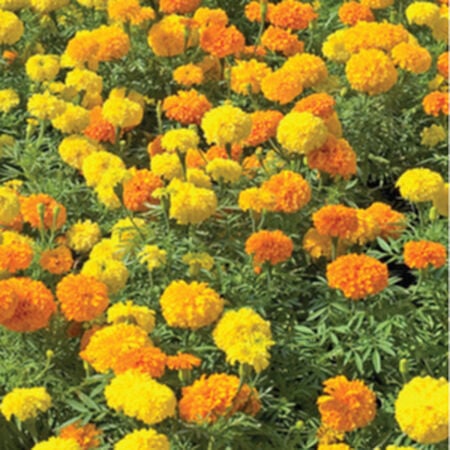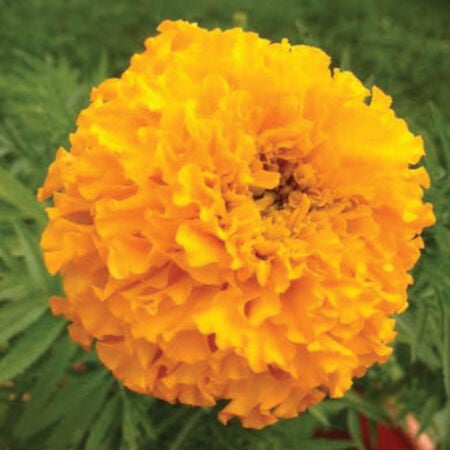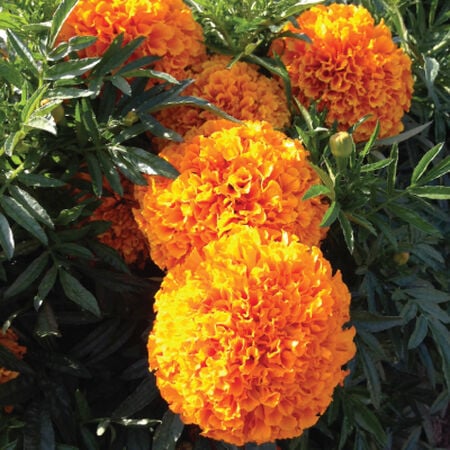Crackerjack, Marigold Seeds
Key Attributes
Product Details
Weight
0.01Depth
0.15Height
4.5Width
3.25Plant Height
12-36"Botanical Name
Tagetes erectaSeed Type
SeedAdditional Characteristics
Deer ResistantSeeds Per Gram
218Seeds Per Pound
99,000Packet
250 SeedsSow Depth
1/2"Seeds Per Ounce
6,188Breed
Open-pollinatedSun
Full SunGrowing Conditions
Container FriendlyLife Cycle
AnnualSow Method
Direct Sow,TransplantCategories
FlowersDays To Maturity (# Days)
45Components
Growing Instructions
![]() Learning Download: How to Grow Marigolds
Learning Download: How to Grow Marigolds
Marigolds are popular, long-lasting and brilliantly colored flowers. Marigolds are commonly grown as annuals, but some varieties are perennials.
Before Planting: Begin Marigolds inside eight weeks before the last frost and place in a warm area. Once seedlings appear, remove the plastic and move to a sunny location.
Planting: Once seedlings have true sets of leaves and after the last frost has passed, transplant outside in a sunny location in a garden bed or container.
Watering: If planted in the ground, only water the Marigolds if dry weather persists for more than two weeks. Water Marigolds daily if they are growing in a container.
Fertilizer: Feed Marigolds with a slow-release 11-40-6 granular fertilizer. Be careful not to overfeed the Marigolds, as too much fertilizer will increase leaf production and decrease bloom production.
Days to Maturity: Marigolds take around 45-50 days to flower.
Harvesting: Harvest Marigolds for cut flowers in the early morning when the blooms are just beginning to open. Set the freshly cut stems in a vase with warm water.
Tips: Encourage more growth by deadheading the spent blooms.
Shipping Schedule
Our Seed Promise
 "Agriculture and seeds" provide the basis upon which our lives depend. We must protect this foundation as a safe and genetically stable source for future generations. For the benefit of all farmers, gardeners and consumers who want an alternative, we pledge that we do not knowingly buy or sell genetically engineered seeds or plants.
"Agriculture and seeds" provide the basis upon which our lives depend. We must protect this foundation as a safe and genetically stable source for future generations. For the benefit of all farmers, gardeners and consumers who want an alternative, we pledge that we do not knowingly buy or sell genetically engineered seeds or plants.
The mechanical transfer of genetic material outside of natural reproductive methods and between genera, families or kingdoms, poses great biological risks as well as economic, political, and cultural threats. We feel that genetically engineered varieties have been insufficiently tested prior to public release. More research and testing is necessary to further assess the potential risks of genetically engineered seeds. Further, we wish to support agricultural progress that leads to healthier soils, to genetically diverse agricultural ecosystems, and ultimately to healthy people and communities.
To learn more about the "Safe Seed Pledge" please visit www.councilforresponsiblegenetics.org.
Key Attributes
Product Details
Weight
0.01Depth
0.15Height
4.5Width
3.25Plant Height
12-36"Botanical Name
Tagetes erectaSeed Type
SeedAdditional Characteristics
Deer ResistantSeeds Per Gram
218Seeds Per Pound
99,000Packet
250 SeedsSow Depth
1/2"Seeds Per Ounce
6,188Breed
Open-pollinatedSun
Full SunGrowing Conditions
Container FriendlyLife Cycle
AnnualSow Method
Direct Sow,TransplantCategories
FlowersDays To Maturity (# Days)
45Components
Growing Instructions
![]() Learning Download: How to Grow Marigolds
Learning Download: How to Grow Marigolds
Marigolds are popular, long-lasting and brilliantly colored flowers. Marigolds are commonly grown as annuals, but some varieties are perennials.
Before Planting: Begin Marigolds inside eight weeks before the last frost and place in a warm area. Once seedlings appear, remove the plastic and move to a sunny location.
Planting: Once seedlings have true sets of leaves and after the last frost has passed, transplant outside in a sunny location in a garden bed or container.
Watering: If planted in the ground, only water the Marigolds if dry weather persists for more than two weeks. Water Marigolds daily if they are growing in a container.
Fertilizer: Feed Marigolds with a slow-release 11-40-6 granular fertilizer. Be careful not to overfeed the Marigolds, as too much fertilizer will increase leaf production and decrease bloom production.
Days to Maturity: Marigolds take around 45-50 days to flower.
Harvesting: Harvest Marigolds for cut flowers in the early morning when the blooms are just beginning to open. Set the freshly cut stems in a vase with warm water.
Tips: Encourage more growth by deadheading the spent blooms.
Shipping Schedule
Our Seed Promise
 "Agriculture and seeds" provide the basis upon which our lives depend. We must protect this foundation as a safe and genetically stable source for future generations. For the benefit of all farmers, gardeners and consumers who want an alternative, we pledge that we do not knowingly buy or sell genetically engineered seeds or plants.
"Agriculture and seeds" provide the basis upon which our lives depend. We must protect this foundation as a safe and genetically stable source for future generations. For the benefit of all farmers, gardeners and consumers who want an alternative, we pledge that we do not knowingly buy or sell genetically engineered seeds or plants.
The mechanical transfer of genetic material outside of natural reproductive methods and between genera, families or kingdoms, poses great biological risks as well as economic, political, and cultural threats. We feel that genetically engineered varieties have been insufficiently tested prior to public release. More research and testing is necessary to further assess the potential risks of genetically engineered seeds. Further, we wish to support agricultural progress that leads to healthier soils, to genetically diverse agricultural ecosystems, and ultimately to healthy people and communities.
To learn more about the "Safe Seed Pledge" please visit www.councilforresponsiblegenetics.org.






